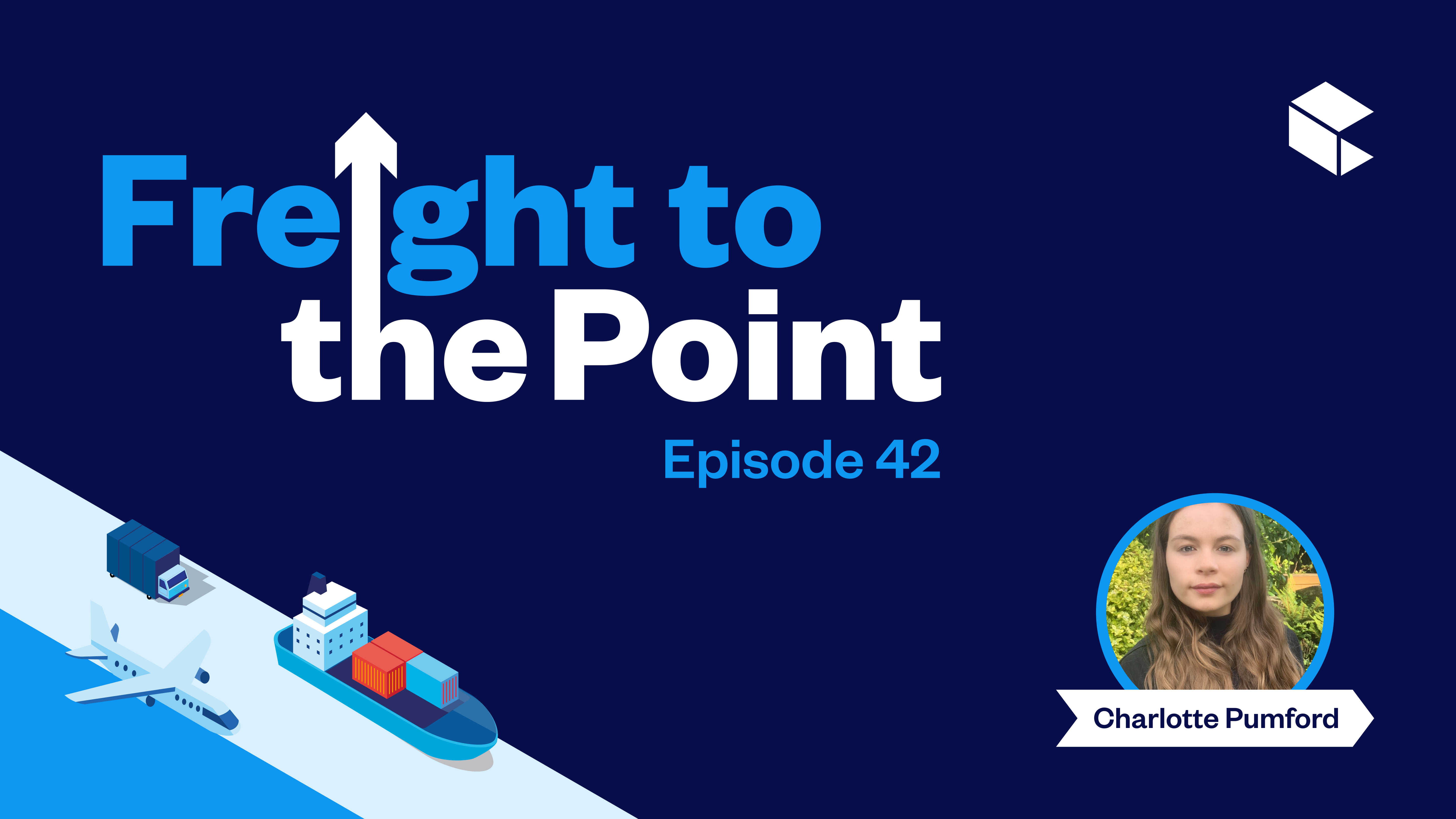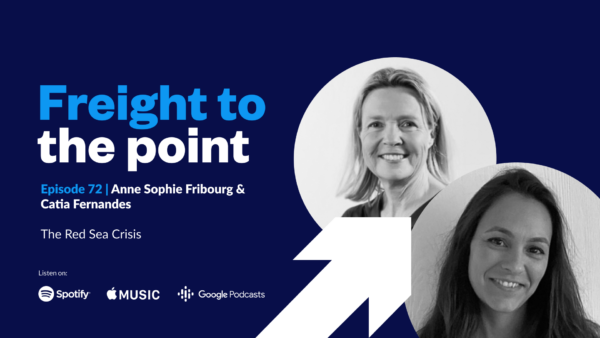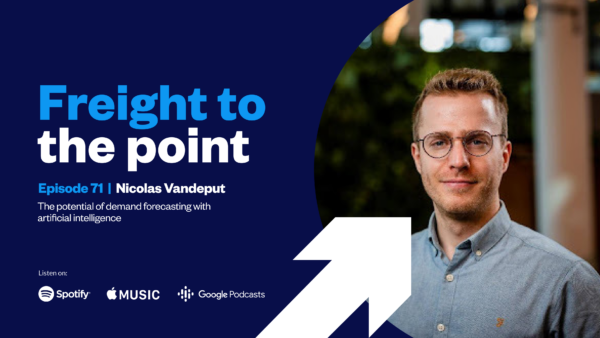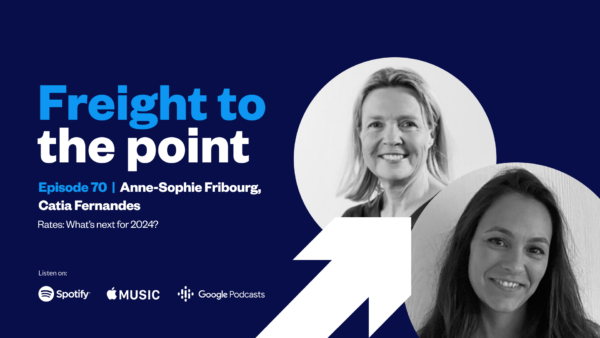Episode 42:
Ethical resilience - Sustainability as a competitive edge
See all episodes

“We truly believe that we’re not doing enough and that we could be doing much more.”
This week, we’re joined by one of Zencargo’s customers, Charlotte Pumford, Head of Sustainability and Regenerative Impact from Vivobarefoot, to explore the benefits of creating regenerative impact in value chains. A value chain is defined as a collaborative network of partner relationships, adding value at every stage.
They talk about:
- The evolution of sentiment towards sustainability for businesses
- Using B-Corp framework to help create a roadmap for improvements
- Understanding your impact through good data collection in order to action change
Charlotte Pumford
Charlotte has almost 10 years of experience working in sustainability across the textile and footwear sector, spanning global FTSE 100 organisations, high-growth SME’s, local government and the management of a small-scale start-up when she founded her own brand in 2013.
For the past 3.5 years Charlotte has been working at Vivobarefoot, a UK-based natural health brand making barefoot footwear and experiences that bring people closer to nature. Charlotte heads up their Regeneration team, managing their journey towards becoming a truly regenerative business, the strategy that delivers on that vision.This is also accompanied by their B Corp Certification and value chain environmental impact programme. Recognised by Edie in 2020 as one of the UK’s 30 under 30 sustainability leaders, Charlotte is a passionate advocate for the protection of our natural world. She believes businesses can be a force for change, identifying the regenerative solutions we need to address global challenges.
Resources
Episode 9: Sustainability in the supply chain with David de Picciotto
Alex Hersham:
Hi, everyone, and welcome to another episode of Freight to the Point, a podcast by Zencargo. I’m Alex Hersham, and today I’m joined by one of Zencargo’s customers, Charlotte Pumford, who’s the head of regenerative impact at Vivobarefoot. Vivobarefoot is a B Corp certified company and offers a range of barefoot footwear and experiences to their customers. They aim to bring people closer to the natural world and to their natural human potential. Today, Charlotte and I will be talking about the importance of focusing on sustainability in the supply chain, how it can reduce risk, and create long-term resilience for businesses in the future. Charlotte, welcome. So, glad to have you.
Charlotte Pumford:
Thank you very much, Alex. Thanks for having me, and lovely to speak with you today.
Alex Hersham:
Great. Let’s dive right in. What does it mean to start a sustainable business?
Charlotte Pumford:
That’s a big question. I think for Vivo, I probably use that as my first counterpoint. So, Vivobarefoot starting and celebrated its 10th year anniversary last year. I think, as an organisation, it’s probably one of the most positive founding stories. So, we offer a range of barefoot footwear and experiences. And innately, within the business itself from startup, I guess the mindset was slightly different to the traditional footwear industry, if you like. Vivo essentially makes barefoot footwear because we believe that the foot itself naturally has everything biomechanically it needs to thrive, and so we believe that adding padding and cushioning into footwear isn’t the way forwards. And biomechanically, the foot can do all of that stuff itself. So, that’s set Vivo apart, I guess from its industry counters from the start. And inherently within that, our founders, Galahad Clark and Asher Clark always believed that sustainability was absolutely the right way forwards and was the only way that a business should be operating.
And so, in its founding story, that was almost inherently a goal from the outset in terms of how we produce footwear, the materials we were using, how we spoke about sustainability and the interaction and the connection of people with nature. And so, I guess in terms of what does it mean to be a sustainable business, I think inherently it comes from the business model itself. It comes from the leadership, it comes from obviously the people that you hire that are your ambassadors, both internally and externally, outside of the business and inside of the business. And it really just comes from, I guess a mindset of wanting to do better, but also knowing that business can be done in a better way.
Alex Hersham:
And over the 10 years, which is an amazing milestone by the way, congratulations, and also puts into context how long we’ve been working together for, because I think we’ve been working together for almost half of Vivobarefoot’s journey. How has that played out in practice in terms of materials sourcing and reaching your vision?
Charlotte Pumford:
Yeah, that’s a good question. I think, of course, it’s always challenging in the wider capitalist structure of how businesses operate. I think sustainability is very challenging. It’s quite difficult. I think the business has always stayed true to its values in terms of making sure that we are designing our footwear and our products to be as sustainable as we possibly can. And we know that we are definitely not good enough and we still have a very long way to go, but we believe we are doing better than most across the industry. And it means making tough calls and tough decisions, so trying to limit and eliminate air freight as much as we possibly can in terms of distribution. It may means making tough calls on materials and making sure that the decisions that we make actually are that sometimes sustainable materials are more expensive than their traditional counterparts.
And so, that means that the business makes a decision from a commercial standpoint, but sustainability is put first in that instance. And I think also, we’re very fortunate to have customers and a huge ecosystem externally of people that are very engaged in Vivo and they really do expect the best from us and us to be operating at a level of best practice. And so, from that perspective, I think that’s kept us on track a lot. But I mean in terms of how that’s operated over the 10 years and beyond, I think fundamentally from a leadership perspective, it’s always kept us on the pathway to challenging ourselves and pushing ourselves to do better.
Alex Hersham:
I think over that 10 year period, most of our listeners will be aware of the change in consumer sentiment towards sustainability, how it’s really becoming top of mind for a lot of people. But then you also have, to your point, the question of price and competition factors, obviously now entering an environment where cost of living is under pressure. How has sentiment evolved? How has competition evolved? How has the discourse changed since your founding?
Charlotte Pumford:
Yeah, that’s a great question. I think I can draw on previous experience of working for large scale corporates in the fashion industry, as much as obviously smaller-medium enterprises like Vivobarefoot. I think we have started to see quite a large scale shift in people wanting more sustainable products and wanting to know more information about where their products are coming from, what materials they’re using, and asking more questions of brands and organisations. I do feel that there is still a huge amount of awareness and behavioral change that’s required for the industry and the wider organisation and community as a whole, in terms of people understanding purchasing habits and understanding the impacts that products do make and do continue to have. I don’t think anyone is truly sustainable, and so making sure that you’re able to move forwards and understand and bring people along on the journey I think is super important.
I think as I mentioned, we’re very fortunate of Vivobarefoot to have highly informed customers who are asking challenging questions of us and are asking and pushing us to do better. I’d say back to the initial point, the industry as a whole has moved forwards and there is a growing level of awareness and challenge of organisations to do much better and to be more transparent. But I think it’s not just from the customer’s perspective, it’s the businesses itself and its government’s legislation that all needs to drive this together. You can’t just do one without the other.
Alex Hersham:
And talking about businesses, there’s been a real wave in businesses applying to become B Corp, which is amazing. I know it’s not an easy process at all, but there’s still quite a lot of businesses that think there’s a choice to be made and they have to choose between sustainability and success, especially in a model that focuses on shareholder value. And value can be defined both in monetary terms and in other terms, hence the rising B Corp. To what extent is that still true?
Charlotte Pumford:
I’d say in larger organisations where the companies and organisations tend to be a lot older and have been working in a specific way with a specific business model for a long time, it’s more challenging when you have more shareholders, when you have various aspects of reporting and legislation for large scale organisations that you need to meet. I’d say it’s easier for a smaller medium business to pivot, but I think fundamentally it still comes down to the mindset of the organisation to change. I think for us at Vivobarefoot, resoundingly, everyone’s in agreement that, actually, sustainability is no longer enough. It’s no longer good enough to just sustain what we currently have when we’re already feeling the effects and impacts of climate change. There are various aspects from environmental degradation, social impact that everyone is acutely aware of, and that’s no longer enough for us to sustain.
We need to be working to be moving towards regenerative business practices. And so, for us, sustainability and beyond is a license to operate as a business. It’s not a either or. It’s not a bolt-on. Sustainability runs through and flows through our organisation and we feel that the cornerstone of that was becoming a B Corp in 2020. It was our first certification. We are due to do our re-certification this year, which we’re excited about. And for us, B Corp is a holistic framework which allows us to look at sustainability, look at how we’re operating, and it gives us a roadmap to continuously improve. And so, it really aligned to our values. It really gave us a pathway. And it’s only the foundation of where we want to get to in terms of becoming a regenerative business, but we really do feel that it’s not a question, it’s just a case of how do we do it as fast and as far as we possibly can.
Alex Hersham:
Let’s talk a little bit about sustainability and supply chains and how that supports the wider goal. Because again, talking about sustainability and is sustainability enough, you can track and offset emissions in supply chains, but it’s very difficult when you think about everything all the way up to your suppliers. Suppliers and materials and water usage through transportation, through distribution and delivery, it’s very difficult to actually get to gross zero rather than net-zero. What are the goals that you want to achieve through your supply chain and through sustainability?
Charlotte Pumford:
Again, great question, Alex. It’s a huge question. I think for us, there’s a few points here to unpack. So, I think inherently and systemically across the industry from a footwear fashion perspective, there is a fundamental lack of transparency. It’s extremely opaque when you’re getting down to raw material level. And for us, that’s a big problem, because we want to be understanding what our impact is all across the areas that we’re working with. We actually use a different terminology from a supply chain. We use the term value chain. Inherently for us historically across the industry, I think a supply chain has been very transactional. And for us from that perspective, we want to be working and forging long-lasting relationships with our partners across the value chain. And that means adding value at every stage.
And so, hand in hand with transparency, we’re trying to build a collaborative network of partners that we can work with, not just on compliance to best practice, but also on innovation as well, which is really important I feel for getting anywhere close to understanding what your impact is from a scope three perspective. For us, I think transparency forms goal number one in terms of getting as much transparency as possible. I mean, we’ve set a pretty lofty goal of radical transparency and we’re due to launch our value chain map, which lists as much transparency as we have of the value chain at the moment on our website in March, which we’re really excited about. And hand in hand with that starts to publish some of the environmental impact data that we’ve collected so far in collaboration with our partners. I think we have this huge strategy for Vivobarefoot, which is moving beyond sustainability towards true regenerative impact.
And that does go beyond net positive, but we know we’re nowhere near good enough right now. But getting there is still the ultimate ambition, because truly sustainability is no longer enough. It’s no longer enough to sustain the environmental degradation and the climate change impacts that we’re currently already experiencing. So, for us inherently, we absolutely, fundamentally need to be looking beyond sustainability. So, I’d say my second point there in a long-winded answer is that data collection and really understanding your impact is fundamental to being able to action change, and working with partners like yourself and like our manufacturing and material partners is critical to doing that. And I guess thirdly, our largest ambition as well when we are talking about impact and collaboration, is to pre-competitive be collaborating with other organisations and brands that we’re working with, that are working with the same manufacturing partners as us.
It’s really important. We’re not doing this alone. Everyone’s using the same manufacturing partners, everyone’s using the same materials, and it’s time for us to start really working more collaboratively together in a transparent way. So, I’d say those are our top three areas. We’re still very much at the beginning of our journey of collecting information to understand what our impact is. And some of the work that we’ve been doing with yourselves in terms of collecting more primary data from what our impact actually is, is only helping to solidify and formulate where we want to go with creating roadmaps to reducing our impact as far and as fast as we possibly can.
Alex Hersham:
Yeah. And I think we’ve been delighted to support you in the work that we’ve done where Zencargo and Pledge have partner to provide a solution to Vivo, to help achieve their greenhouse goal, the greenhouse gas monitoring and reduction goals. And that’s really great. But let’s just come back to the broader area as to the vision. And Vivo is now a decade plus old. It’s really been a leader. It’s an incredible brand with an incredible mission and a very engaged audience. Where do you hope it will be in 10 years time? What’s the world that you want to live in 10 years time and what does Vivo look like in that environment?
Charlotte Pumford:
Yeah. It’s huge, I guess in terms of from an aspect. Fundamentally, and I think I probably said this a couple of times now, but we truly believe that we’re not doing enough, that we could be doing much more. And that actually whilst we’re doing, we believe better than most across the industry, we still have a very, very long way to go. We wouldn’t call ourselves sustainable. And I think in terms of that, for us, it gives us ambition and it gives us drive in terms of continuous improvement. We’re very fortunate in these uncertain times to be growing as an organisation and really being able to start from the starting point we have at the moment, which is at the very beginning of our journey. I think we all feel very fortunate to be able to shape and understand where we’re going to go as a business over the next 10 years.
Innovation plays a critical part in that process. Collaboration plays a critical part, as mentioned in that process. We want to be getting to a point where we have full circularity over our products, so we’re utilising the most sustainable materials we possibly can or materials for regenerative sources if possible. We want to be processing them in the most efficient ways. We want to be understanding and working collaboratively with our partners across the value chain to be doing that and manufacturing in the least impactful way as possible. And that requires collecting data and that requires understanding what our impact is at every stage. And we want to be engaging our customers and our wider ecosystem in terms of what does it truly mean to offer a sustainable product and the ambitions around going beyond sustainability to regeneration. And we want to be then collecting that product back at the end of its life and engaging the customers in that process, recycling it.
So, we’re working on an infrastructure for full recycling for our footwear, which we hope to have some exciting news on very soon. And then being able to utilise the output of that recycling process back into new products. For us, nothing is sustainable unless we can enact true circularity. But that’s just the products. We have big visions. We have a platform called VHealth. And Vivobarefoot very much is a natural health brand as much as it is a footwear brand. And that includes training on barefoot coaching, it includes ecosystem engagement around natural health and what it means to thrive and I guess be the best version of yourself. And so, there’s various different avenues and channels to that, that we have just very much started and that we see a big future for. But for us, it’s also, we have a fund called the Livebarefoot Fund, and that’s an in-house impact incubating fund, if you like, for innovation.
And that enables us to put money into developing new materials with partners, various aspects of collaborations around preserving indigenous cultures, biomechanics research. And so, being able to amplify a lot of that work as well, I think is a huge priority for us in terms of it’s not just us as a small brand, it’s the collaboration piece. It’s the transparency piece and the honesty piece, but it’s also around the innovation aspects and how we can start to amplify the message and bring more people along in our wider community.
Alex Hersham:
I’ve got to say, I’m so energised listening to you, because it’s so clear that the vision and the why behind Vivobarefoot really runs through the DNA of the business. And I love that you’re talking about we’re not where we want to be, we’re still early in the journey, rather than in any way thinking about how you can be super positive. And it is very positive what Vivobarefoot’s done and everything that you’re talking about really does bring me back to what I said earlier, where I said that Vivobarefoot aims to bring people closer to the natural world and to their natural human potential. And everything you’re saying does that, but it’s also so energising to hear from you how you’re still early in the journey and how much there is that can still be done and that has to be done over the next 10 years. So, to round it off, give our audience the three points on why businesses need to become sustainable in order to operate.
Charlotte Pumford:
So, I guess very much rounding up what I’ve spoken about throughout our time this morning, but the first one is sustainability and moving beyond that really is a license to operate into the future. It’s not a bolt-on, it’s not an addition to the existing business model. It’s a fundamental change to your business model to make sure that it inherently runs through all aspects of your organisation. As I mentioned, we’re already seeing the impacts of climate change. We’re already witnessing the impacts of environmental degradation and issues around social aspects around human rights and modern slavery, et cetera. And for us, it really does fundamentally need to be a part of the leadership and the business model that you enact as an organisation. And the organisations that don’t, I feel will be a complete detriment in terms of survival in future.
Secondly, I think for us in terms of why, just without the age-old saying of it’s the right thing to do, I think really because inherently it gives you opportunity as an organisation. I think it gives you opportunity to innovate. It gives you opportunity to move beyond best practice and it does give you an opportunity to engage customers, and gives you opportunity to engage partners in a different way of working with, I guess a more positive outlook rather than just measuring risk and very much being an active participant in terms of a community. You can really start to shape fundamentals of how you change. And it’s very exciting in terms of the opportunities that open up when you start to broaden your outlook of what you want to achieve as an organisation.
And thirdly, I think I’m going to keep on the opportunity side of things, but I think it does give you an opportunity to shape how you work with others in a way which has been historically very different. So, the final point really for me is that we really do desperately need to be working more collaboratively together with other organisations that I guess historically we would’ve deemed our competitors. And for me, that’s absolutely resounding in that we can’t do this alone. No one can do it alone. It’s a global challenge that needs a global response. And so, I think overwhelmingly and resoundingly, collaboration and innovation, and just because it’s the right thing to do, because it allows you to operate into the future, are my three main points I think.
Alex Hersham:
Thank you, Charlotte. I’ve really enjoyed this. It’s been an informative but also an inspiring session. And it’s making me think about how we as a business in Zencargo can also do more and think more forward and collaborate more. Thank you to everyone for joining us for another episode of Freight to the Point. Don’t forget to like and subscribe to our series on Spotify, Apple Podcasts, Google Podcasts. If you enjoy this episode, feel free to follow Charlotte on LinkedIn as well, if you want to hear more about the journey that Vivobarefoot and Charlotte are taking and the transformation that they’re making to the industry. And if you have any questions, please do feel free to reach out to either of us on LinkedIn. We’d absolutely love to hear from you. And thank you all very much.

Episode 72: The Red Sea Crisis
In the latest episode of Freight to the Point, we’ve featured our most rec...

Episode 71: The potential of demand forecasting with artificial intelligence
In the most recent instalment of Freight to the Point, Lucie Phillips, Zen...

Episode 70: Rates: What's next for 2024?
As we prepare for the year ahead, it's crucial to consider the three pillars...

